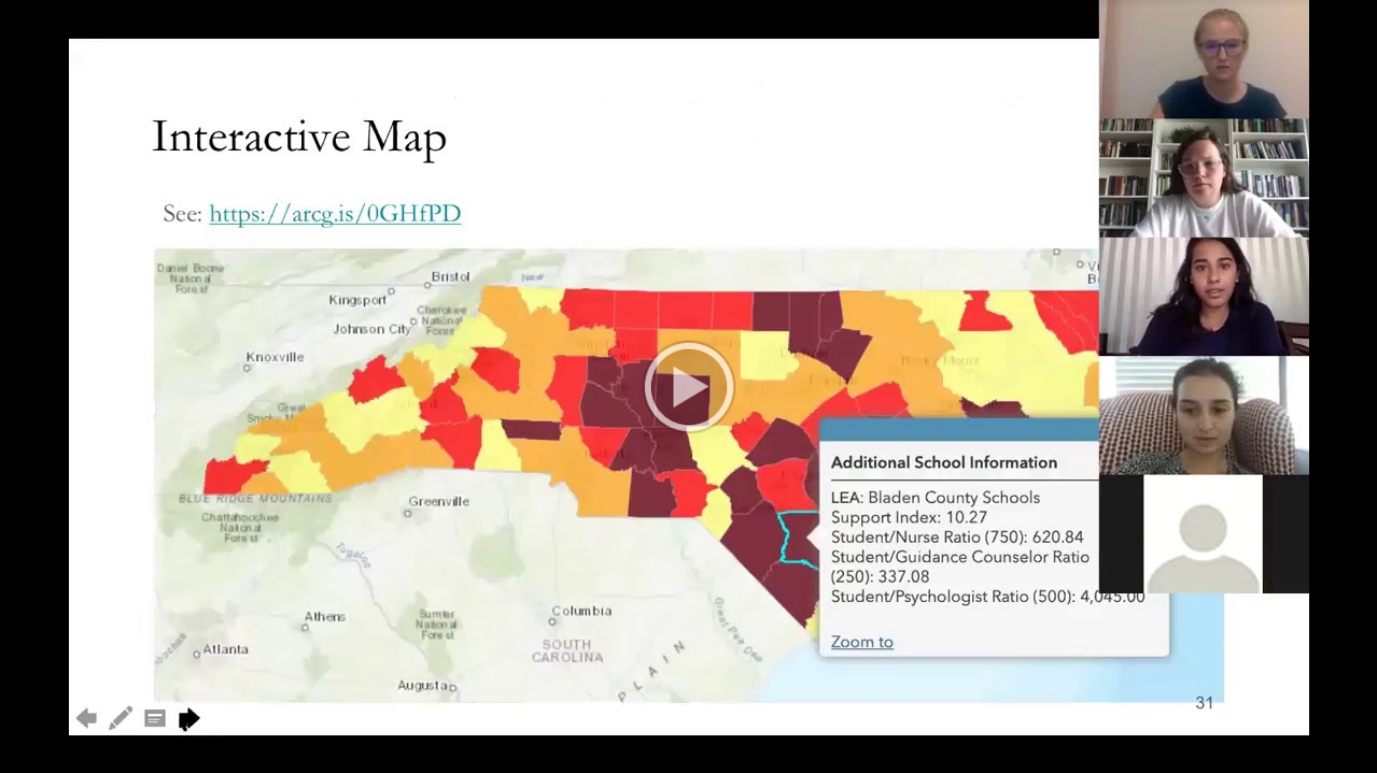Recent alums deliver press conference on the Impact of COVID 19 on North Carolina
July 20, 2020

The Impact of COVID-19 on North Carolina
Team
Health: Aditi Adhikari ’20, Rachel Beardsley ’20, Olivia Huckel ’20, Anwesha Nandi ’20
Economy: Gretchen Blankinship ’20, Etheridge Daniels, Valerie Lundeen ’20, Susanna LaRochelle ’20, Ray Palma
Poverty: Abby Cooper ’20, Sarah Mackenzie ‘20, Allie Omens ‘20, Lauren Talley ’20
Education: Coleman Evans ’20, Lucy Russell ‘20, David Smith ‘20, Emily Parker ’20
Faculty Advisor
Daniel Gitterman, Duncan MacRae ’09 and Rebecca Kyle MacRae Professor and Chair of Public Policy
Ph.D. Student Mentors
Claire Breen, Alexandria Huber, Adams Nager
Mentors
JB Buxton, Richard Harrill, and John Hardin
The authors acknowledge generous funding from the Hodding Carter III Public Service Fund, Hammer Ph.D. Fund, John Hardin Undergraduate Excellence Fund,
Thomas W. Ross Leadership Fund and Nancy Stegman Ph.D. Fund.
Zoom Press Conference July 23, 2020 (Zoom VIDEO)
(Impact of COVID-19 on North Carolina)
Presentation | Executive Summary
US Census Household Pulse Survey Data (NC)
Related information
Governor Cooper Directs $95.6 Million to Support Students Impacted by the COVID-19 Pandemic
Media Coverage of Press Event
UNC College of Arts and Sciences profile
TRADITIONAL MEDIA
UNC Group Shows Coronavirus Impact is Unequal Across NC
As COVID-19 cases surge among Latinos, N.C. leaders amplify messages of preventive measures
Will Michaels (WUNC) Chance Of Dying From COVID-19 Is Higher In NC’s Rural Counties, Report Says
A report from UNC Chapel Hill says there’s a higher probability of death from COVID-19 in some of North Carolina’s rural counties.
A group of public policy students analyzed death and infection rates in each of the state’s 100 counties. They found the highest-risk areas had more people of color, higher poverty rates and multiple meat processing plants.
Researcher Aditi Adhikari says existing health care disparities in rural areas could have factored in the results.
Maggie Brown (WRAL) UNC research: Areas hardest hit by coronavirus face greater challenge to get students back in the classroom
A research team from the University of North Carolina at Chapel Hill released findings on Thursday about how the coronavirus has had a disproportionate impact across the state.
One of the findings was that school districts in areas were COVID-19 cases per 100,000 were the highest were the least prepared to support student needs.
“We don’t really know how students have been impacted in terms of achievement,” the research team reported.
Judith Retana (CBS 17) UNC research shows NC schools not prepared to support students during pandemic
A research report from a group of UNC-Chapel Hill Public Policy students and recent alumni found North Carolina schools were largely underprepared for the return of school.
The students found people were facing higher rates of anxiety in the last few months.
That was partly due to the finding that counties with greater probabilities of COVID-19 deaths were more likely to have higher poverty rates.
(WWAY) UNC Chapel Hill students present data on statewide COVID impacts
As the pandemic continues to hit people and communities in North Carolina, students at UNC Chapel Hill released data showing how it has specifically affected different populations.
The group of students gathered data over the last few months on how people have been affected socioeconomically, physically and emotionally.
According to the data, Columbus County was one of the top ten counties in the state with the highest likelihood of contracting COVID-19. Students explained, six of those counties have six or more animal farms, and rely on the meaat processing industry.
SOCIAL MEDIA
Aaron Sánchez-Guerra (News & Observer) Via Twitter: NC counties with meat processing plants also have large non-white populations and high poverty levels, which are all factors that give those counties high Covid-19 death rates, this UNC study says.
Analisa Sorrells, Chief of Staff at Education NC Via Twitter (full thread): I’m tuning into a presentation on the impact of COVID-19 in North Carolina by @UNCPublicPolicy graduates + students. They are sharing data related to COVID-19’s impact on the economy, education, and more.
